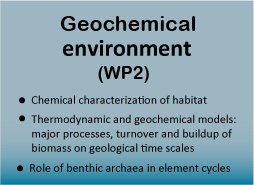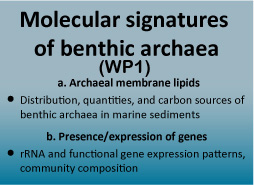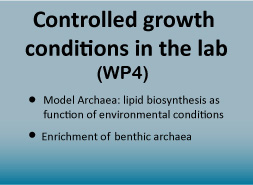Page path:
- Organic Geochemistry
- ERC-DARCLIFE
Hinrichs Lab - DARCLIFE
Deep subsurface Archaea: carbon cycle, life strategies, and role in sedimentary ecosystems
Background and objectives
Archaea are a poorly understood domain of life. They have long been considered to be exotics that only occur in extreme environments like hot springs and salt lakes but are nowadays increasingly recognized as globally abundant organisms that mediate important processes controlling greenhouse gases and nutrients.
Our recent discovery of archaeal dominance in the deep subseafloor is now suggesting a significant contribution of Archaea to the global biomass. Following this discovery, the unique and diverse sedimentary Archaea with no cultured representatives, so-called benthic archaea, have become a major research target in the Hinrichs Lab.
We are particularly interested in the biogeochemistry of the deep subseafloor because marine sediments are of crucial importance to the redox balance and climate of our planet. In this context, the regulating role of the deep biosphere remains one of the great puzzles. A better understanding of benthic archaea is key to solving it. The large abundance of Archaea in the deep subseafloor might be related to their unique ability to cope with extreme energy starvation, and their presumed ability to degrade complex recalcitrant organic residues highlights their relevance for the carbon cycle and as potential targets for biotechnology.
With DARCLIFE we have initiated a project to study benthic archaea, their carbon cycle and life strategies in the deep subseafloor. We aim to better understand the role of Archaea in the Earth system and to examine the fundamental properties of life at minimum energy. The project involves an interdisciplinary team of scientists from the fields of biogeochemistry, earth sciences, and microbiology. DARCLIFE started in April 2010 and is funded for five years through an Advanced Grant of the European Research Council.
Our recent discovery of archaeal dominance in the deep subseafloor is now suggesting a significant contribution of Archaea to the global biomass. Following this discovery, the unique and diverse sedimentary Archaea with no cultured representatives, so-called benthic archaea, have become a major research target in the Hinrichs Lab.
We are particularly interested in the biogeochemistry of the deep subseafloor because marine sediments are of crucial importance to the redox balance and climate of our planet. In this context, the regulating role of the deep biosphere remains one of the great puzzles. A better understanding of benthic archaea is key to solving it. The large abundance of Archaea in the deep subseafloor might be related to their unique ability to cope with extreme energy starvation, and their presumed ability to degrade complex recalcitrant organic residues highlights their relevance for the carbon cycle and as potential targets for biotechnology.
With DARCLIFE we have initiated a project to study benthic archaea, their carbon cycle and life strategies in the deep subseafloor. We aim to better understand the role of Archaea in the Earth system and to examine the fundamental properties of life at minimum energy. The project involves an interdisciplinary team of scientists from the fields of biogeochemistry, earth sciences, and microbiology. DARCLIFE started in April 2010 and is funded for five years through an Advanced Grant of the European Research Council.
Research approach
We use an integrated, interdisciplinary research approach to study benthic archaea, their carbon cycle and life strategies in the deep subseafloor. Central to our research strategy is the information encoded in structural and isotopic properties of sedimentary membrane lipids from benthic archaea. With metagenomic analysis we aim to establish a phylogenetic framework and to gain insights on potential metabolism. With in-depth geochemical examinations of the habitat we seek to elucidate processes that are mediated by benthic archaea in situ. In order to develop the full potential of lipids as proxies for studying nearly inaccessible microbial life, we grow model Archaea under a set of environmental conditions and examine the impact on cellular lipid distributions.
At the same time, innovation in structural and isotopic analysis of complex lipids is a key task. We are continuously seeking to provide innovative analytical solutions tailored to the specific requirements of DARCLIFE such as analysis of minute quantities of microbial lipids in complex matrices. Moreover, regular workshops in the course of the project serve to integrate the multidisciplinary data set for exploratory and hypothesis-driven statistical analyses.
At the same time, innovation in structural and isotopic analysis of complex lipids is a key task. We are continuously seeking to provide innovative analytical solutions tailored to the specific requirements of DARCLIFE such as analysis of minute quantities of microbial lipids in complex matrices. Moreover, regular workshops in the course of the project serve to integrate the multidisciplinary data set for exploratory and hypothesis-driven statistical analyses.
Work packages
DARCLIFE-Team
For DARCLIFE we have formed a team of early-career and established scientists covering the required wide area of expertise from marine chemistry and geochemistry, analytical chemistry, molecular-isotopic organic geochemistry, geomicrobiology, and microbiology. So far, 24 scientists have contributed to the DARCLIFE-team as PhD students and postdoctoral researchers who are funded through DARCLIFE or as contributors with other funding sources, together with four master students, two technicians, one computer specialist and one adminstrative assistant.
In DARCLIFE we are collaborating with several research institutes including the Archaeenzentrum in Regensburg, the Teske Lab at the University of North Carolina in Chapell Hill, USA, the Alfred-Wegener-Institute (AWI) for Polar and Marine Research in Bremerhaven, and the Max-Planck-Institue (MPI) for Marine Microbiology in Bremen.
In DARCLIFE we are collaborating with several research institutes including the Archaeenzentrum in Regensburg, the Teske Lab at the University of North Carolina in Chapell Hill, USA, the Alfred-Wegener-Institute (AWI) for Polar and Marine Research in Bremerhaven, and the Max-Planck-Institue (MPI) for Marine Microbiology in Bremen.
Publications

“This project has received funding from the European Union’s Seventh Framework Programme for research, technological development and demonstration under grant agreement no 247153”.









